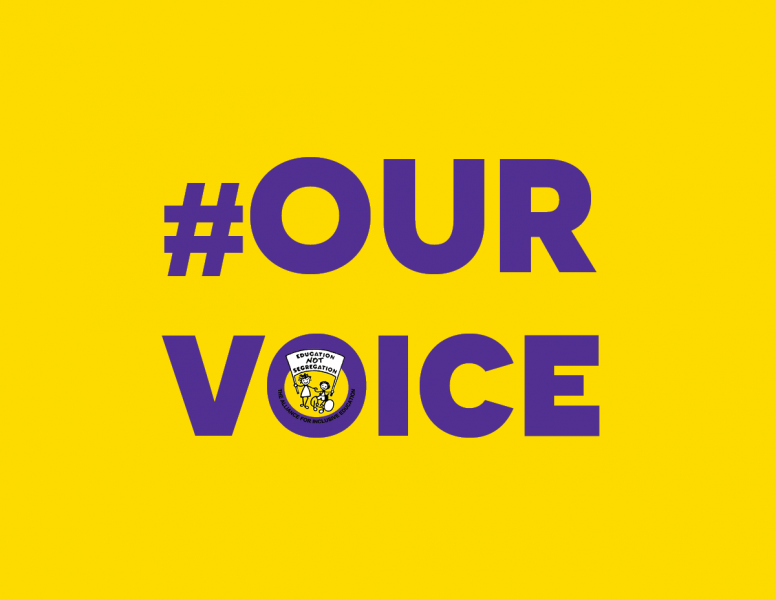Our Voice Project: What We Learned
During the COVID-19 pandemic, ALLFIE launched ‘Our Voice’ project, to listen to Disabled Young people’s voices and address their education concerns. Armineh Soorenian, Project Coordinator, reports back on key take away messages, including isolation and intersectional exclusion.

During COVID-19, ALLFIE became increasingly aware that Disabled people’s voices were marginalised in any debates on, and responses to, the pandemic. Through our work, we noticed that Disabled Young people were experiencing even more isolation and felt cut off from their school communities. These experiences were further increased for Disabled Young people with intersectional identities.
As a result, we applied to the DPO COVID-19 Emergency Fund, organised by National Emergencies Trust (NET), to set up a COVID-19 national participation project for Disabled Young people. We received the funding and created the Our Voice project.
The aim of the project was to address the isolation and intersectional exclusion of Disabled Young people during the pandemic and to listen to what matters to them.
In the sessions, we explored such topics as disability language, social model of disability, independent living, and the impact of COVID-19 on their lives.
Different members of the ALLFIE team came to each session to deliver training or bring their expertise to the discussions, while my role as a Project Coordinator was to facilitate the meetings and support the Young people as they created the various resources available on the Our Voice webpage.
During the project, we identified some valuable lessons, which I am sharing in this blog:
Time
Eleven Young people, between the ages of 16 and 25, took part in the project in total. The group size varied from week to week, and allowed in-depth discussions and time for sharing. It was very exciting to meet everyone, in some cases for the first time. From this experience, we learned to aim for smaller online groups in the future projects so that the sessions would be made more accessible to participants as we could support them better when they attended. In doing so, this would allow everyone to feel able to meaningfully participate and contribute.
Technology
Unfortunately, not everyone had access to appropriate technology and/or an internet connection and those who had did not always have a stable internet connection. Due to this, we sometimes missed some valuable voices and experiences in the project. ALLFIE’s resources are limited, so we were not able to address this in the Our Voice project but for future meetings, we are considering ways of addressing the technology divide where possible and looking at ways of supplying equipment and lobbying to improve access to technology for all.
Communication
The group members had different impairments and, as such, their support needs varied. As the facilitator, I needed to ensure that the sessions were accessible for the Young people. For example, early on we recognised that the way we were communicating had to change as not everyone in the group interacted at the same pace. We realised that we had to allow time and space for the participants to be able to talk and feel part of the group. So that’s what we did, and the members learned the new way of communicating with each other. This helped everyone to feel comfortable being in the group. It worked so well that the trainers who visited the group commented how well everyone worked together.
Empowerment
Soon I felt the group was ready to lead itself, and I learned to step back in a way that allowed me to continue supporting them and instilling confidence in the Young people, which greatly empowered them.
On 22nd June, the group lead, chaired and presented a panel discussion, talking about their experiences of the Our Voice project. I couldn’t have been happier and more proud at witnessing how the group had grown organically and how well the members bonded and supported each other in solidarity. It showed what they could do when given the opportunity.
I would like to thank all the Disabled Young people for teaching me so much, the last six months have certainly been an excellent learning journey, for us all at ALLFIE and of course for the Disabled Young people themselves.
Following the success of Our Voice, ALLFIE has decided to extend the project until at least December 2021, and refer to the first stage as Phase 1. We have decided to continue the project until at least the December 2021. In the second phase, we will talk about the inclusion of intersectional Disabled Young voices in the Disabled people’s movements as well as some other new and exciting topics. I can’t wait to see what happens next!
Armineh Soorenian, Our Voice Project Coordinator
![Allfie [logo]](https://www.allfie.org.uk/wp-content/themes/allfie-base-theme/assets/img/allfie-logo-original.svg)




Discussion
There are no comments so far.